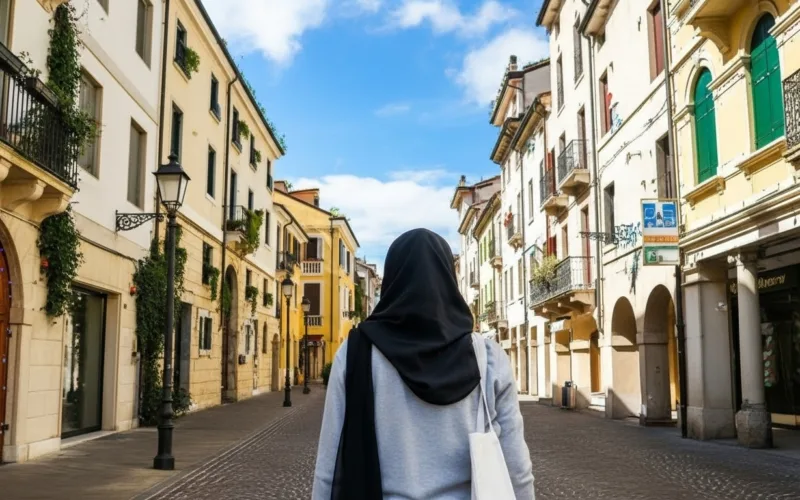Key Takeaways
- Italy proposes ban on burqa and niqab in public
- Fines range from €300 to €3,000 for violations
- Part of broader bill addressing “Islamic separatism”
ROME — Italy’s ruling Brothers of Italy party has drafted legislation to prohibit wearing burqas and niqabs in public spaces, with fines between €300 and €3,000 for violations.
The bill targets face-covering garments in locations including schools, government offices, and commercial establishments.
Lawmaker Andrea Delmastro, who helped develop the proposal, stated the measure addresses religious expression within constitutional boundaries.
“Religious freedom is sacred, but it must be exercised in the open, in full respect of our constitution and the principles of the Italian state,” Delmastro wrote in a social media post.
The legislation defines specific garments affected by the ban. The burqa covers a woman’s entire body including a mesh screen over the eyes, while the niqab leaves the eye area visible but conceals the rest of the face. Both would be prohibited under the new regulations in most public settings.
Sara Kelany, immigration head for Brothers of Italy, explained the ban forms part of comprehensive legislation targeting what Prime Minister Giorgia Meloni’s government terms “separatism.”
The broader bill includes provisions regulating mosque financing, prohibiting forced marriages, and requiring religious groups without state recognition to disclose foreign funding sources.
The proposed fines correspond to the severity of violations, though enforcement details remain unspecified.
Similar bans exist in several European nations including France, Belgium, and Denmark, where legislation prohibits face coverings in public areas.
The announcement follows increased political focus on religious symbols in European public life. Italy’s center-right government has emphasized cultural integration measures since assuming office, with this legislation representing their latest initiative addressing religious practices.
Muslim community representatives have not yet issued formal responses, though previous face-covering bans in Europe prompted legal challenges and public demonstrations.
The bill’s progression through Italy’s parliamentary system will determine its final form and implementation timeline.
The legislation emerges as European governments continue debating the balance between religious freedom and secular values in public spaces.
Italy’s approach incorporates financial transparency requirements for religious organizations alongside garment restrictions, creating a multifaceted policy addressing multiple aspects of religious practice.
Government officials indicate the bill will undergo standard legislative review processes, with potential amendments, before any final vote.
The Brothers of Italy party holds a parliamentary majority, suggesting likely approval despite expected opposition from civil liberties organizations and religious groups.


 WhatsApp Channel
WhatsApp Channel
 Instagram
Instagram
 Facebook
Facebook
 X (Twitter)
X (Twitter)
 Google News
Google News